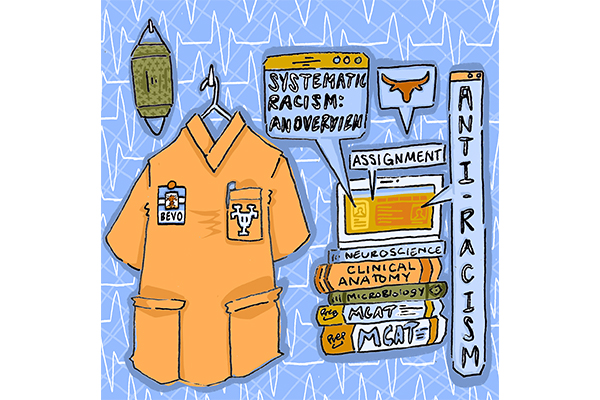Two years ago, Danica Sumpter, a clinical assistant professor at the UT School of Nursing, listened to a KUT report on Black women’s maternal mortality and learned that Black women in the United States are two to three times more likely to die while giving birth compared to white women in a study of five pregnancy complications.
Sumpter, a Black woman and an educator, said after listening to the story, she knew she had to do something about systemic racism in the professional health care field. Sumpter is currently developing a toolkit for anti-racist teaching to provide resources, education and training to future health care workers to combat instituionalized racism in the field, according to a School of Nursing press release.
“There needs to be some training, some skills, some strategies offered to help people navigate these difficult waters,” Sumpter said. “Cultural competencies (in) education has been around for a few decades, but it’s not doing the job in terms of eradicating or minimizing health inequities.”
Sumpter was recently chosen as a Macy Faculty Scholar with four other health care professionals. The two-year program will engage the scholars in workshops designed to improve them as educators and provide them a grant to develop their educational projects, Holly Humphrey, president of the Josiah Macy Jr. Foundation, said in an email. Sumpter is developing the toolkit as her educational project with the funding from the program, she said.
“(Sumpter’s) work in anti-racism is crucial to helping faculty prepare the health care workforce of the future to address the root of systemic inequities and foster diversity, equity and belonging in health professions education and practice,” Humphrey said.
Sumpter said the toolkit will educate professional health care faculty through online modules, assignments and videos to promote teaching strategies that faculty can use to address racism in the health field.
“If the idea of anti-racist content (will help) people have an ‘equity lens,’ that will, in turn, lead to more health professionals that see their patients (and) their communities through an equity lens (so) that they have an understanding of how systemic racism works,” Sumpter said.
Sumpter said the content in her toolkit was influenced by her time teaching a new course called Race, Power, Privilege and Health, a course she believes has influenced many of her enrolled students, such as nursing graduate student Sara Williams.
“I really hope (the toolkit) is something that all of the nursing programs adopt, and even just universities in general,” Williams said. “We often get … a diversity and inclusion statement from Penn State or UT … where they’re like, ‘We support Black and brown communities,’ but how? What's the tangible action here?”
Sumpter said she is looking forward to having the toolkit ready by the end of the spring 2021 and hopes it can be of use globally.
“I see it cutting across disciplines and not just something locally but something more broadly across the country,” Sumpter said. “I think that's the beauty of the online piece, that now … we've got reach.”





















